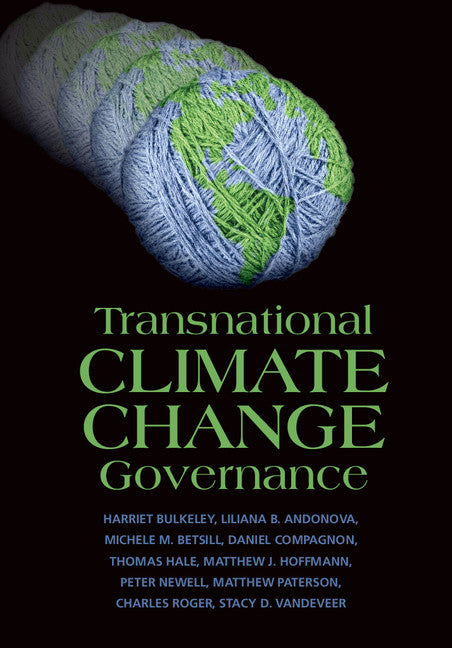Freshly Printed - allow 4 days lead
Couldn't load pickup availability
Transnational Climate Change Governance
Leading experts provide the first comprehensive account of transnational efforts to respond to climate change, for researchers, graduate students and policy makers.
Harriet Bulkeley (Author), Liliana B. Andonova (Author), Michele M. Betsill (Author), Daniel Compagnon (Author), Thomas Hale (Author), Matthew J. Hoffmann (Author), Peter Newell (Author), Matthew Paterson (Author), Charles Roger (Author), Stacy D. VanDeveer (Author)
9781107068698, Cambridge University Press
Hardback, published 21 July 2014
222 pages, 30 b/w illus. 4 tables
26.1 x 18.1 x 1.8 cm, 0.62 kg
'This excellent volume offers the first comprehensive assessment of the countless transnational initiatives that have emerged in recent years in climate change governance. The author team of ten prominent scholars in the field has intensively collaborated over several years in scrutinizing a large dataset of sixty transnational climate governance initiatives from three major theoretical perspectives. In an area that has drawn so far largely on single case studies or smaller comparisons, Transnational Climate Change Governance now finally takes the debate a fundamental step forward. This crucial and timely volume is a must-read for all those interested in climate governance.' Frank Bierman, Vrije Universiteit, Amsterdam, Lunds Universitet, Sweden, and Chair, Earth System Governance Project
The world of climate politics is increasingly no longer confined to the activities of national governments and international negotiations. Critical to this transformation of the politics of climate change has been the emergence of new forms of transnational governance that cut across traditional state-based jurisdictions and operate across public and private divides. This book provides the first comprehensive, cutting-edge account of the world of transnational climate change governance. Co-authored by a team of the world's leading experts in the field and based on a survey of sixty case studies, the book traces the emergence, nature and consequences of this phenomenon, and assesses the implications for the field of global environmental politics. It will prove invaluable for researchers, graduate students and policy makers in climate change, political science, international relations, human geography, sociology and ecological economics.
1. Introducing transnational climate change governance
2. Mapping the world of transnational climate change governance
3. Theoretical perspectives on transnational governance
4. Origins, agency and the forms of transnational climate change governance
5. Constructing transnational climate change governance issues and producing governance spaces
6. The uneven geography of transnational climate change governance
7. Understanding authority and legitimacy in transnational climate change governance
8. Making a difference? Tracing the effects and effectiveness of transnational climate change governance
9. Conclusions - looking beyond transnational climate governance.
Subject Areas: Conservation of the environment [RNK], The environment [RN], Geography [RG], Earth sciences, geography, environment, planning [R], Environment law [LNKJ], International environmental law [LBBP], International law [LB], Environmental economics [KCN]


